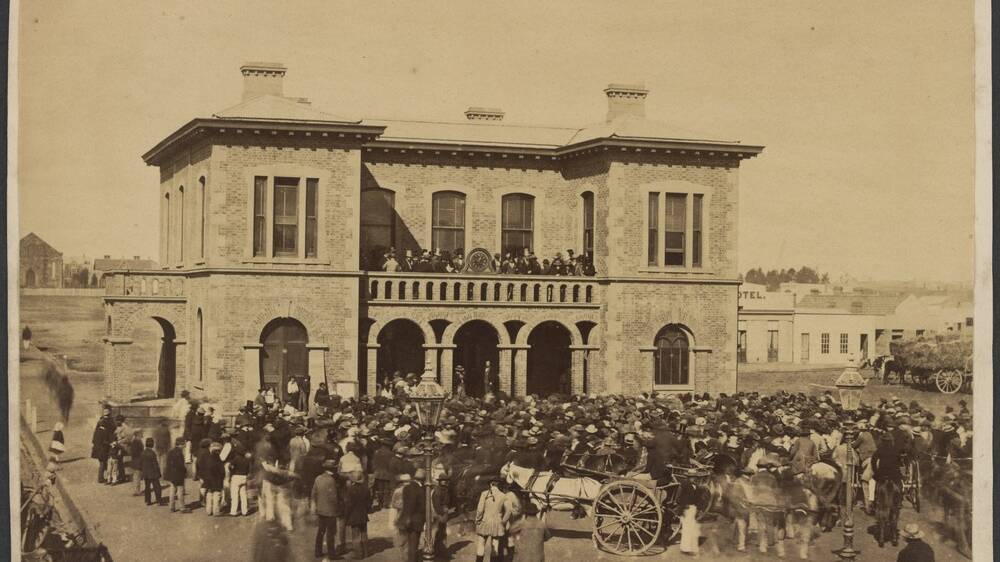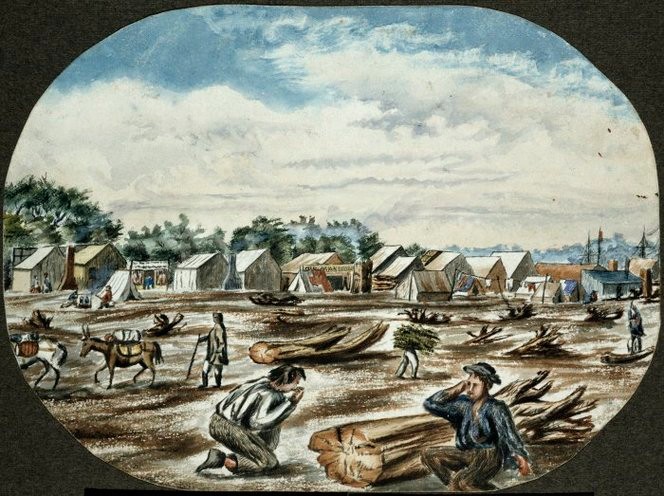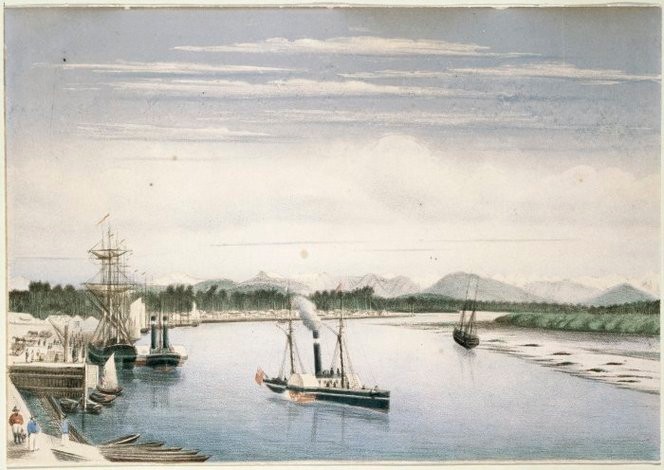Two more siblings were born before Edward's mother Emma passed away in August 1846 from heart failure, aged just 42. William married again in early 1847 to Mary Elizabeth Sunnex and had a further three children.
Unlike his brother George, who learned his trade as a draper through apprenticeship in London, Edward is listed in the 1851 census at home with his family, presumably learning the butchery trade.
His father William passed away on December 1857.
Like his brother, with both his parents gone the young Edward evidently saw little point in remaining in the squalor and filth of the Chatham of the time. Edward left "home and sweetheart" at the time of the Melbourne gold-rush to seek his fortune; he
 |
| Bendigo Town Hall 1861 |
 |
| Hurt, Theodore (1860-1871), Hokitika, Westland, N.Z. 1865. Alexander Turnbull Library, Wellington. Both characters appear to be scratching themselves, presumably from the Sand Flies. |
He was in New Zealand sufficiently long to have been successful for a ballot for a town section in Queenstown. Newspaper records suggest that he was in Queenstown by February 1864. Gold was discovered in Hokitika in 1864 and hearing the news Edward had moved to Hokitika by June 1866. By 1866 the town had quickly grown to be the most populous settlement in New Zealand. At Hokitika he established himself in partnership in a butchery business by December 1867 and, went home again to England in May 1868 aboard the "Vimiera" to claim his bride, now a man of means.
| Hokitika, 1867 |
However the story goes that absence had not made her heart grow fonder (perhaps Edward’s roving life and the poor communications of the time maybe the reason). Edward’s home-coming was not a happy one - he was jilted. His brother William pacified him by saying, "Never mind, there are better fish in the sea. She's not worth worrying about – wait until you get home and see what I've got for you."
And who was it? Esther Tompkins, the sister of William's wife, Sophia, a young (on-the-shelf in those days) woman of 25 years old, holding down a job as head cook and with excellent prospects ahead of her.
Edward claimed Esther as his bride and they married in December 1868, setting sail for Melbourne by the "Coeur de Lion" en route for New Zealand in late March 1869. Travelling with them was Charlie Gurr, Ted's younger brother. The shippers had taken on a load of gunpowder and tried to cancel the passengers' berths, but Ted wouldn't budge and a special hut was built on deck for these three and one additional passenger. Esther was woefully sick for three weeks and on the whole voyage did not set eyes on another woman. The boat called at Capetown and they stayed perhaps a week after arriving in Melbourne on the 2nd June 1869, getting their first mail with the news of the death of Esther's father confirming Esther's premonition.
They transhipped at Melbourne for Hokitika aboard the "S. S. Rangitoto" on the 10th June but when at last New Zealand was sighted the breakers were too heavy for the passengers to land, so they cruised round the coast delivering cargo for about a month before eventually reaching their destination a month later (presumably disembarking at Wellington and transferring to another ship) – a journey of about eight months. Ted is recorded as being back in Hokitika on 9th July.
When Ted Gurr had left New Zealand previously his butchery business in Hokitika had been flourishing in the care of his partner whilst he took a trip home to get his bride. On his return however, he discovered that his partner Reedy had sold the business and decamped with the proceeds.
Charlie operated a slaughterhouse in partnership in Hokitika and married a local girl, later moving to Dunedin.
It seems that Esther and Ted tried the business again, advertising the butchery in the West Coast Times in November 1869, but the hot weather spoiled the meat and times apparently weren't so good so they were forced to look elsewhere for sustenance. Ted took to gold prospecting, going back into the country of Ross. He acquired claims here and there, but without luck.
Two years after Ted and Esther's marriage along came their first child, Esther; but how Ted wanted a son! Emma Elizabeth was born seventeen months later and, at last, exactly two years after Emma, came the first son – Edward William.
By May 1874 they had moved to Greymouth. It is not known how the little family fared financially at this stage. Harry was born in May 1877. Four children now, and work and cash did not come easy. 1877 also brought the news of the death of Esther's brother Stephen, leaving four children, three girls and one boy, who are put in orphanages. The home ties are gradually breaking.
In December 1878 Ted dissolved the partnership for his butchery business and by about March 1879, Ted Gurr had "had the West Coast" and, leaving his wife and family at Greymouth, went to Wanganui to spy out prospects. Letters written to Esther indicate what a loving family man he was and how concerned he was for their welfare. May was born 1st May 1879, and when she was five weeks old, Esther packed her worldly possessions, four children plus the new baby, and moved home per "Wallibi" to Aramoho. Home was a rough hut somewhere in the vicinity of Gibson Street.
The first tragedy. On 11th April 1880, Esther dressed the four older children in their best clothes and sent them for a walk with Ted, him sending them home by themselves. She was bathing baby May when people rushed in to say that young Teddy was drowned; the children apparently had been playing near Field's Creek and the boy had fallen in and drowned in just two feet of water. Nobody knew of artificial respiration. Dementedly Esther rushed out leaving the baby in the bath, where she was discovered some time later.
Charlie was born in November 1881, and at about this time the family moved to a better house across the way. May Gurr remembers when she was about three or four years old, carrying the important only wooden doll, Moggy, as her share of the move.
Young Esther (Ett) and Emmy are now old enough to go to work. Ett was away in Wellington when, on 16th June 1890, came the sudden news of the death of Ted Gurr with a heart attack.
Ted's death evidently left the family in dire straits, with a benefit concert being staged for the benefit of the family, attended by an audience of around 200 and was clearly a major event raising £12 and 1s (around £1,400 today).
Esther (Ted's widow) ran a boarding house in Aramoho near the railway station from 1892 until at least 1897. The location is commemorated today by a street named "Gurr Place", though the railway station is long gone.
Extracts from "One Hundred Years 1869-1969, Gurr Family Centennial" by Louis Gurr
Thanks to Michael Chambers for additional research and contributions
And who was it? Esther Tompkins, the sister of William's wife, Sophia, a young (on-the-shelf in those days) woman of 25 years old, holding down a job as head cook and with excellent prospects ahead of her.
| The Couer de Lion at Port Adelaide |
.jpg/800px-StateLibQld_1_172927_Rangitoto_(ship).jpg) |
| The Rangitoto |
 |
| Cooper, William M (1833-1921) Hokitika. Chromolithograph of ship and paddlesteamer at Hokitika wharf. 1868-70. Alexander Turnbull Library, Wellington, New Zealand. |
Charlie operated a slaughterhouse in partnership in Hokitika and married a local girl, later moving to Dunedin.
It seems that Esther and Ted tried the business again, advertising the butchery in the West Coast Times in November 1869, but the hot weather spoiled the meat and times apparently weren't so good so they were forced to look elsewhere for sustenance. Ted took to gold prospecting, going back into the country of Ross. He acquired claims here and there, but without luck.
Two years after Ted and Esther's marriage along came their first child, Esther; but how Ted wanted a son! Emma Elizabeth was born seventeen months later and, at last, exactly two years after Emma, came the first son – Edward William.
By May 1874 they had moved to Greymouth. It is not known how the little family fared financially at this stage. Harry was born in May 1877. Four children now, and work and cash did not come easy. 1877 also brought the news of the death of Esther's brother Stephen, leaving four children, three girls and one boy, who are put in orphanages. The home ties are gradually breaking.
In December 1878 Ted dissolved the partnership for his butchery business and by about March 1879, Ted Gurr had "had the West Coast" and, leaving his wife and family at Greymouth, went to Wanganui to spy out prospects. Letters written to Esther indicate what a loving family man he was and how concerned he was for their welfare. May was born 1st May 1879, and when she was five weeks old, Esther packed her worldly possessions, four children plus the new baby, and moved home per "Wallibi" to Aramoho. Home was a rough hut somewhere in the vicinity of Gibson Street.
The first tragedy. On 11th April 1880, Esther dressed the four older children in their best clothes and sent them for a walk with Ted, him sending them home by themselves. She was bathing baby May when people rushed in to say that young Teddy was drowned; the children apparently had been playing near Field's Creek and the boy had fallen in and drowned in just two feet of water. Nobody knew of artificial respiration. Dementedly Esther rushed out leaving the baby in the bath, where she was discovered some time later.
Charlie was born in November 1881, and at about this time the family moved to a better house across the way. May Gurr remembers when she was about three or four years old, carrying the important only wooden doll, Moggy, as her share of the move.
Young Esther (Ett) and Emmy are now old enough to go to work. Ett was away in Wellington when, on 16th June 1890, came the sudden news of the death of Ted Gurr with a heart attack.
Ted's death evidently left the family in dire straits, with a benefit concert being staged for the benefit of the family, attended by an audience of around 200 and was clearly a major event raising £12 and 1s (around £1,400 today).
Esther (Ted's widow) ran a boarding house in Aramoho near the railway station from 1892 until at least 1897. The location is commemorated today by a street named "Gurr Place", though the railway station is long gone.
Extracts from "One Hundred Years 1869-1969, Gurr Family Centennial" by Louis Gurr
Thanks to Michael Chambers for additional research and contributions

Wow, very interesting history! Im descended from the Thomas and Martha line and was wondering if you have any links or history for that branch? I have seen the tree, but just names and dates with little detail. I tried to follow your links for roots web, but it appears that site is down. Thanks for taking the time to post your research!
ReplyDeleteThanks!
DeleteYou mean the Thomas Gurr and Martha (nee Harris) who emigrated to the US and settled in Illinois? They're two generations back. I have facts and sources listed in my Ancestry version of the tree (more current than the Rootsweb version anyhow) at: https://www.ancestry.co.uk/family-tree/person/tree/48272228/person/12872591247/facts (Free registration required).
A lot of the extra detail in the Edward Gurr story (and the companion George Gurr story) comes from newspaper reports and family insights. I haven't done any of that work for Thomas as he's not on my direct line.
If you or anyone else wanted to have a crack at it, I'd love to host the story!
Thomas's father John Gurr (1736-1790) ran the Crown & Anchor pub in Chatham, Kent from at least 1778 to 1790.
This comment has been removed by a blog administrator.
ReplyDelete